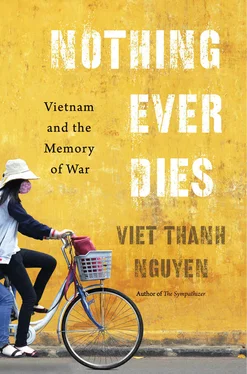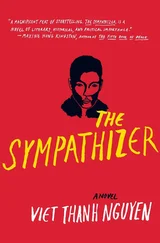And yet all wars have murky beginnings and inconclusive endings, oftentimes continuing a preceding war and foreshadowing a later one. These wars often do not take place only in the territories for which they are named, but spill over into neighboring countries; they are also shaped in war rooms and boardrooms distant from the battlefields. Wars are as complex as individuals, but are remembered by names that tell us as little as the names of individuals do. The Philippine-American War implies symmetry between two nations, yet it was Americans who seized the Philippines and instigated the carnage. The Korean War implies a conflict between Koreans, when China and the United States did more than their fair share of the fighting. In the case of the Vietnam War, Americans invented the name, an odd handcuffing of two nouns that has become normal through constant repetition. So normal, in fact, that even if the name is abbreviated to Vietnam, as it so often is, many people still understand it to mean the war. In response, many have protested that Vietnam is a country, not a war. But long before this cry, some of the Vietnamese (the ones who eventually won) had already begun calling it the American War. 4Still, if the Vietnam War is an inadequate name in the sense that it misleads us about the war’s identity, is the American War any better?
This name excuses the various ways in which Vietnamese of all sides also own the war, from its triumphs and its disasters to its glories and its crimes. Not least the name encourages Vietnamese people to think of themselves as victims of foreign aggression. As victims, they are conveniently stricken with amnesia about what they did to one another and how they extended their war westwards into Cambodia and Laos, countries that a unified Vietnam would strive to influence, dominate, and even invade in the postwar era. 5These ambivalent meanings of the American War are matched by those found in the Vietnam War. While that name has come to represent American defeat and humiliation, there are also elements of American victory and denial, for the name limits the war’s scale in space and time. When it comes to space, either name effaces how more than just Vietnamese or Americans fought this war, and how it was fought both inside and outside of Vietnam. When it comes to time, other American wars preceded it (in the Philippines, the Pacific Islands, and Korea), occurred at the same time (in Cambodia, Laos, and the Dominican Republic), and followed it (in Grenada, Panama, Kuwait, Iraq, and Afghanistan). These wars were part of a century-long effort by the United States to exert its dominion over the Pacific, Asia, and eventually the Middle East — the Orient, broadly defined. 6Two landmark years bracketed this century. In 1898, America seized Cuba, the Philippines, Puerto Rico, and Hawaii, inaugurating an overseas expansion of American interests that ran into unexpected resistance in 2001, with 9/11 and the ensuing conflicts in the Middle East. The real American War was this entire American Century, a long and uneven expansion marked by a few periodic high-intensity conflicts, many low-intensity skirmishes, and the steady drone of a war machine’s ever-ongoing preparations. The result is that “wartime has become normal time in America.” 7
To argue over the Vietnam War or the American War is thus to argue over false choices. Each name obscures human losses, financial costs, and capital gains, as well as how the war also blazed through Cambodia and Laos, something both the Vietnamese and the Americans wish neither to acknowledge nor remember. The North Vietnamese sent troops and materiel through Cambodia and Laos, and the U.S. bombing of these efforts, as well as the civil wars that flared up in both countries, killed approximately four hundred thousand in Laos and also seven hundred thousand in Cambodia during what the journalist William Shawcross sarcastically called the “sideshow” to the war. If we count what happened in a bomb-wrecked, politically destabilized Cambodia during the Khmer Rouge regime of 1975–1979 as the postscript to the war, the number of dead would be an additional two million, or close to one-third of the population, although some estimates say the count was only 1.7 million, or about a quarter of the population. The body count in Vietnam for all sides was closer to one-tenth of the population, while the American dead amounted to about 0.035 percent of the population. 8
In tabulating a war’s costs and consequences, postscripts should count as well as sideshows, both of which are erased in the names of the Vietnam War or the American War. They contain the damage to the years 1965–1975, to the country of Vietnam, to a death toll of about three million. Counting the sideshows in Cambodia and Laos would raise that number to around four million, while adding the postscripts would make the total approximately six million. Refusing the war’s given names acknowledges that this war, like most wars, was a messy business not easily or neatly contained by dates and borders. To deny it a name, as I will do by sometimes simply calling it the war, clears a space for reimagining and remembering this war differently. Denying this war its name also acknowledges what everyone who has lived through a war already knows: their war needs no name, for it is always simply the war. Referring to another war, her own, the writer Natalia Ginzburg says, “We will never be cured of this war. It is useless. We are people who will never feel at ease, never think and plan and order our lives in peace. Look what has been done to our houses. Look what has been done to us. We can never rest easy again.” 9
This war — admittedly, my war — was not even fought only between the two sides in the two names, American and Vietnamese. In reality, these nations were fractured, the United States into its pro- and antiwar factions and the Vietnamese into north and south as well as communist and anticommunist, ideological positions which did not divide neatly with the geography. The war also had other national participants, Cambodians and Laotians bearing the brunt, but also many South Koreans. To see how they remembered their war and have themselves been remembered, as I will do, is not an attempt at total inclusion and total recall, since I pass over other participants in silence (Australians, New Zealanders, Filipinos, Thai, Russians, North Koreans, Chinese …). 10But expanding the story to include people outside of Vietnam and the United States is my gesture at both the need to remember and the impossibility of total memory, since forgetting is inevitable and every book needs its margins. Still, my desire to remember as many as I can is a reaction to the lack of inclusiveness found in many, and perhaps most, memories of the war, or at least the ones circulating before the public. What these public memories show is that nations and peoples operate, for the most part, through what I call an ethics of remembering one’s own. This ethics has national variations, with the Vietnamese more willing to remember women and civilians than the Americans are, the Americans more willing than the Vietnamese to remember the enemy, and neither side showing any inclination for remembering the southern Vietnamese, who stink of loss, melancholy, bitterness, and rage. At least the United States gave the southern Vietnamese who fled as refugees to American shores the limited opportunity of telling their immigrant story and, by so doing, inserting themselves into the American Dream. 11The Vietnamese government only offered them reeducation camps, new economic zones, and erasure from memory. Little surprise, then, that the exiled southern Vietnamese also insist, for the most part, on remembering their own.
For both nations and their diverse constituents, including the defeated and exiled Vietnamese, an alternative ethics of remembering others is the exception, not the rule. This ethics of remembering others transforms the more conventional ethics of remembering one’s own. It expands the definition of who is on one’s own side to include ever more others, thereby erasing the distinction between the near and the dear and the far and the feared. Working from both ends of the ethical spectrum, from remembering one’s own to remembering others, I thread together the memories of my war’s dramatis personae, men and women, young and old, soldiers and civilians, majorities and minorities, and winners and losers, as well as many of those who would fall in between the binaries, the oppositions, and the categories. War involves so many because war is inseparable from the diverse domestic life of the nation. To think of war solely as combat, and its main protagonist as the soldier, who is primarily imagined as male, stunts the understanding of war’s identity and works to the advantage of the war machine.
Читать дальше












